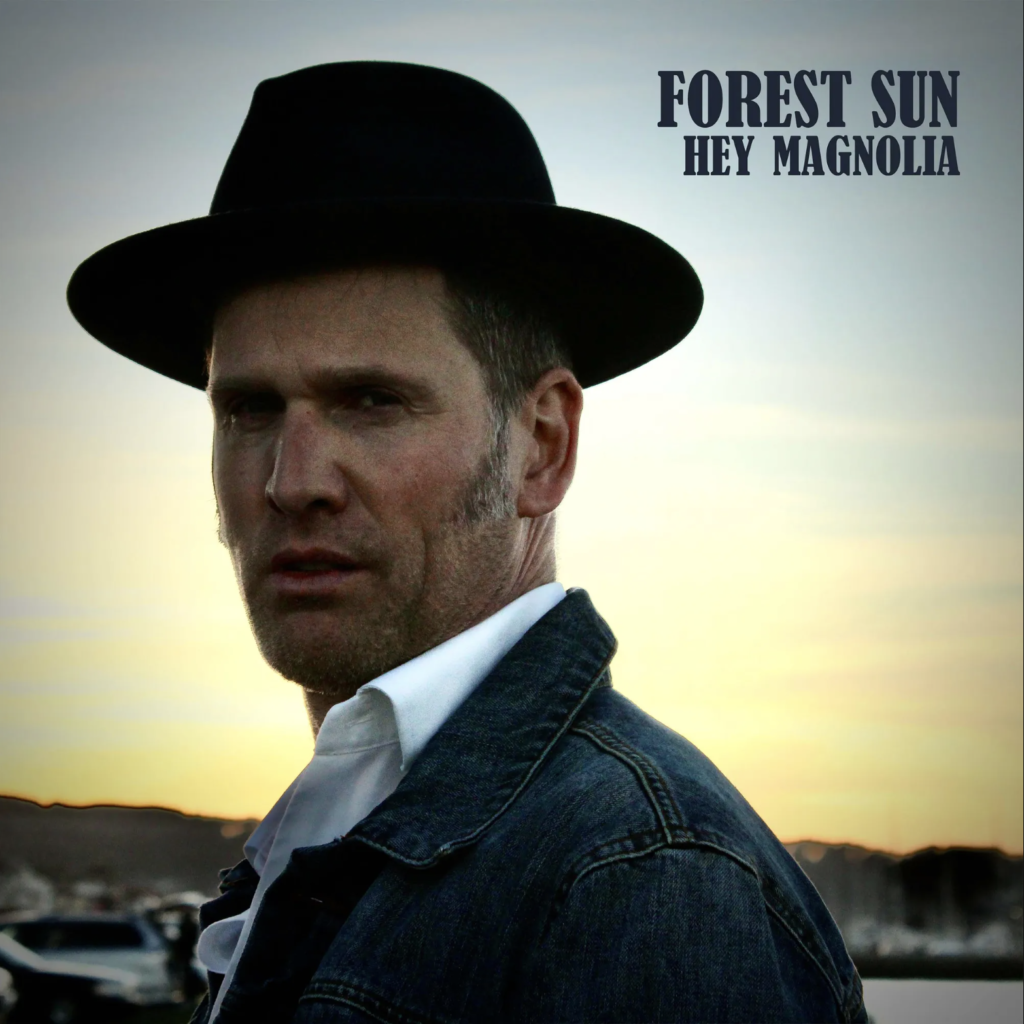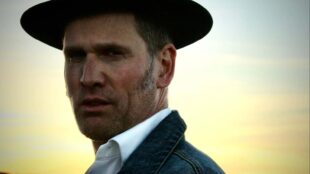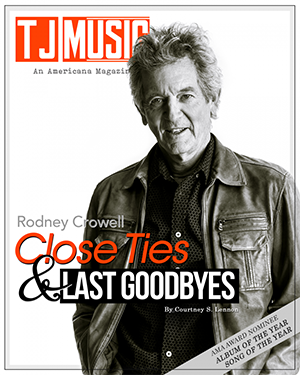
By Brian Rock
Folk poet extraordinaire, Forest Sun shares a dozen well-crafted new songs on his twelfth album, Hey Magnolia. Unlike the optimistic romanticism of last year’s Follow The Love, Hey Magnolia, finds Sun in a more contemplative, meditative, and occasionally spiritual mood. Dealing primarily with feelings of loss and loneliness that result from the time or distance that separates us from our loved ones, Sun gives a voice to the unspoken emotions that haunt us in our darkest hours. His deft turn of phrase and nuanced instrumentation (including mandolin, cello, dobro, fiddle, and Hammond organ,) keep the album from feeling too weighty.” Part Bob Dylan and part Rumi, “Hey Magnolia” is Forest Sun doing what he does best: creating musical poetry that gets better with each listen.
The title track, “Hey Magnolia,” is both a beginning and an endpoint in Sun’s journey. Singing, “Hey Magnolia it’s good to see you. It’s been a while since I’ve been here. Twelve moons have crossed the sky, feels like more than just a year;” he expresses the joy of returning home. The name Magnolia symbolizes returning home both to a lover and to nature. An acoustic guitar, a dobro, and a mandolin emphasize the rootsy, nature aspect of the title. After expressing his joy at this brief reunion, Sun prepares to leave again. Asking, “There’s no getting off this one-way track. Do you know how that feels?”; he confronts the conundrum of a musician’s life on the road. The Piedmont blues infused rhythms play like a comforting lullaby as he ponders his cyclical lifestyle, singing, “I spent too long traveling; in my dreams – the only time I’m with you.”
“Only Passing Time,” finds Sun questioning his life choices. Singing, “I thought I’d change the world, but the world changed me,” he shows signs of self-doubt. Like Kansas’ “Dust In The Wind,” he begins to question the meaning of his existence. “For A Little While,” sees Sun reminiscing about an ex-lover. He ponders the people who pass in and out of his life as he keeps moving along. “Love That Keeps On Trying,” gives a glimmer of hope on his journey. Drawing a metaphor, Sun sings, “Do you remember when we were small, they couldn’t tell us a thing at all. We’d ride our bikes too fast and fall, but we’d get up again.” Even when we don’t do it right, love is still worth getting up and trying again. “Lost In The Dark,” is a gentle, bittersweet hymn to finding yourself. He sings, “The brightest heart that I’ve ever seen got lost in the dark and the in between.” Commenting on his own journey, he sings, “Hallelujah, I can feel it all around me. Hallelujah, I’m glad you found me.” After seeking a person or place to fill the hole in his rambling heart, he finds comfort in Spirit. He finally finds a measure of enlightenment on, “At Last You Find.” Singing, “Yesterday is closer than today will ever be,” he recognizes the accumulated burden of our past. He also discovers that, “They try to govern your wildness with a digital leash;” that our obsession with trivial matters prevents us from exploring deeper matters. Like a soul calling to itself, he sings, “When you beg, and you’re small, and you’re nothing at all – that’s where you’ll find me.” He finally realizes that to find Truth, you must let go of everything else. His cycle of discovery is beautifully punctuated by his musical arrangements. Simultaneously sparse and lush, Sun gets maximum emotional impact from each note of each instrument. Like Israel Kamakawiwo’ole’s version of “Somewhere Over The Rainbow,” Sun’s interplay between vocals and instruments is rapturous.
And that’s just the first half of the album.
Adding some musical diversity, Sun explores bluegrass rhythms on, “All The Mornings Have an Echo.” Revisiting earlier themes, he muses, “Who knows how long I’ll be running? Who knows how long I’ll be gone? This life is trying to show me something you’ve probably known all along.” The bluesy, “Underwater,” examines the defenses we use to keep from getting hurt, even when those defenses start to become the very thing that hurts us. Lively, folk-rock rhythms propel the semi-autobiographical, “Someday.” Looking back on his own quest, Sun sings, “He always said he’d set the world on fire. It’s what he told himself, and he’s a pretty good liar.” Soulful Hammond organ permeate the yearning, “We May Not Ever Make It Home.” Reflecting on the darkest part of his journey, his despair is offset by the Gospel-tinged melody. Singing, “They tore it down today. That old place we used to play. All those ghosts and memories with nothing left to save,” he realizes you can never really go home. Like the Native American proverb about never stepping twice in the same river, even your home changes with the passage of time. Continuing the soul rhythms, Sun waxes philosophic on, “At The End Of Everything.” Contemplating the cycle of days, seasons, and lifetimes, he sings, “At the end of everything we know, will it all just start again? If we can’t learn to let it go, what will happen to us then?” Vintage Stax organ and guitar melodies add to the soul-searching impact. Going back to bluegrass rhythms, Sun bids goodnight to a distant love on “Sweet Dreams, Caroline.” Like a hero from one of Joseph Campbell’s mythic journeys, Sun returns from his quest to share his wisdom with the community he left. Humbled from his experience, he sings, “Maybe the world doesn’t need us to save it, but you can’t blame us for trying.” Encapsulating all that he’s learned, he reveals that the goal of life is simply living and loving in the moment, or as he declares, “I’ll take the love over the gold.”
forestsun.com | fb | buy
Brian Rock
Latest posts by Brian Rock (see all)
- Nicolette & The Nobodies The Long Way - April 15, 2024
- Driftwood’s December Last Call - March 22, 2024
- Ted Russell Kamp’s California Son - March 15, 2024


